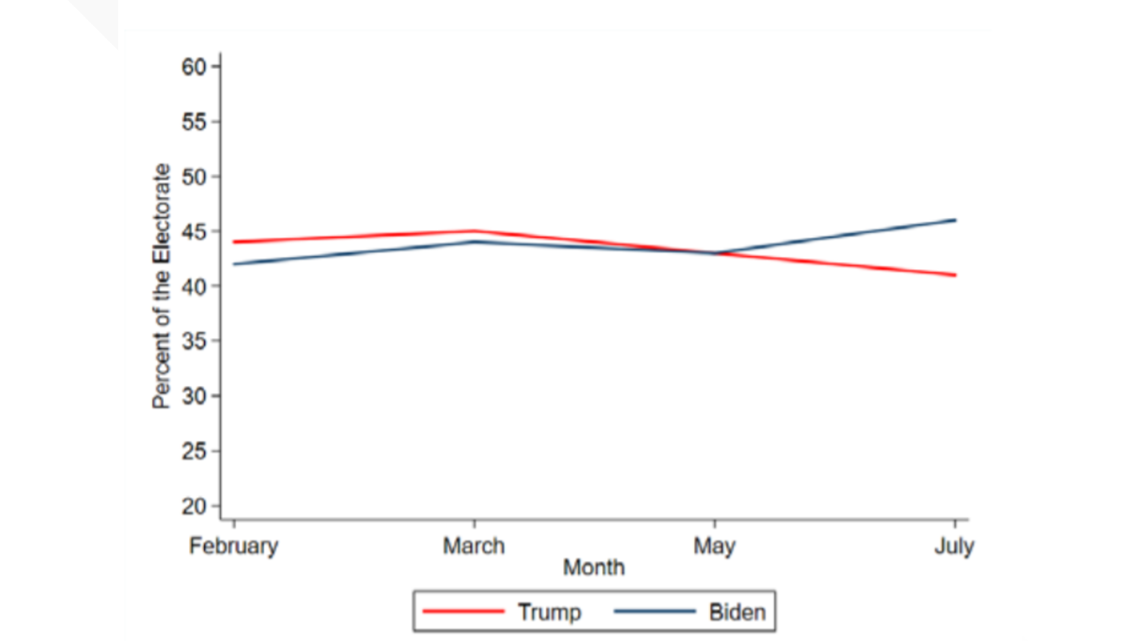TYLER, Texas — Ahead of the primary elections, a University of Texas at Tyler Center for Opinion Research survey indicates voters are continuing to show resilience and enthusiasm.
On Monday, UT Tyler announced the highlights of the poll that was conducted from June 29 - July 7.
COVID-19
“Our surveys throughout the spring and summer have shown Texans have been receptive to public health recommendations, but this survey found 14% more residents have worn a mask in the past week,” said Dr. Mark Owens, UT Tyler assistant professor of political science, who conducted the poll. “Many individuals who have been wearing face masks as a precaution have done so because local businesses have required one to shop, friends have encouraged them to do so or public officials have suggested it.”
The survey began before the statewide mask order went into effect on July 3, and shortly after bars were closed across the state of Texas on June 26.
PRESIDENTIAL ELECTION
The UT Tyler/Dallas Morning News poll also found that if the presidential election were held today, a plurality of Texans would vote for Joe Biden (46%) over President Donald Trump (41%) for president. This result comes after four previous surveys in February, March and April 2020, found the candidates to be within the margin of error.
Since the last survey, the decrease in support for the president’s re-election is also reflected in his lower job approval rating (from 45% in April to 42% in July), as well as the public’s diminished approval of his handling of the coronavirus pandemic (from 43% in April to 38% in July).
The survey examined Texans feelings regarding issues pertaining to racial injustice.


SOCIAL JUSTICE MOVEMENT
“In the wake of last month’s social unrest, Texans remain deeply ambivalent about the Black Lives Matter movement and related issues of racial injustice,” says Dr. Kenneth Bryant Jr, assistant professor of political science.
While a plurality noted they are less likely to support the goals of the movement as a result of the protests (37%), nearly one-third said they were more likely to do so. Additionally, while 47% of Texans support the right of athletes to kneel during the national anthem, a strong plurality (47%) do not believe this should be done to bring attention to racial concerns in society, he added.
U.S. SENATE RACE
The race for the Democratic nomination for the US Senate is getting closer. MJ Hegar continues to receive the most support with 32% (same as April). However, support for state Sen. Royce West has increased 4% since April and is now at 20%.
Thirty-seven percent of Democratic primary voters still remain undecided in who they will vote for. Nevertheless, regardless of who wins the runoff, incumbent Sen. John Cornyn remains ahead of both candidates head-to-head and is increasing his support.
ABSENTEE BALLOTS
When asked how voters would cast their ballots in the upcoming election; only 14% indicated they would request an absentee ballot.
In April, 37% of registered voters indicated they would prefer to request an absentee ballot during the coronavirus pandemic.
“This large shift in voting behavior may show the impact of the recent Texas Supreme Court and US Supreme Court decisions not to allow voters to request an absentee ballot because of fear of becoming infected with the coronavirus,” Owens said.
METHODOLOGY
The Dallas Morning News/UT Tyler Poll reflects a statewide random sample of 1,909 registered voters during the eight days between June 29 and July 7.
The mixed mode sample includes 129 registered voters who were surveyed by the Center for Opinion Research over the phone and 1,780 registered voters that were randomly selected from a panel of registered voters that are contacted to take surveys by the Dynata.
The online and phone surveys were conducted in English and Spanish. The data were weighted to be representative of the Texas register voter population. Iterative weighting was used to balance sample demographics to the state population parameters, specifically the estimated gender, age, race/ethnicity, and education of registered voters in the state using an iterated process known as raking.
These parameters were derived from 2018 Current Population Survey to reflect Texas’s electorate. The use of these weights in statistical analysis ensures that the characteristics of the sample closely reflect the characteristics of registered voters in Texas. This was done separately for the probability phone sample and the online sample, before one weight was generated by standardizing the non-probability online sample with the probability phone sample (see Elliott 2009).
In this poll, the sampling error for 1,909 registered voters in Texas is +/- 2.24 percentage points at a 95% confidence interval. The survey’s design asked additional questions to 898 registered voters who indicated they voted in the Democratic Primary (margin of error of +/- 3.27%).
Visit uttyler.edu/politicalscience/pollingcenter for more information about our current and previous studies.
A member of the prestigious UT System, The University of Texas at Tyler focuses on student success and innovative research in the more than 80 undergraduate and graduate degree programs offered to nearly 10,000 students. Classified by Carnegie as a doctoral research institution and by U.S. News and World Report as a national university, UT Tyler has campuses in Tyler, Longview, Palestine and Houston.

